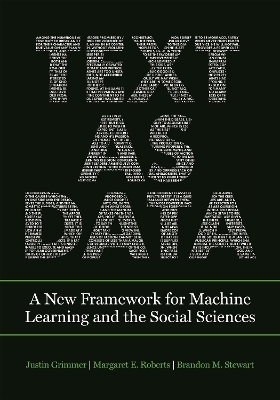
Text as Data
A New Framework for Machine Learning and the Social Sciences
Seiten
2022
Princeton University Press (Verlag)
978-0-691-20755-1 (ISBN)
Princeton University Press (Verlag)
978-0-691-20755-1 (ISBN)
A guide for using computational text analysis to learn about the social world
From social media posts and text messages to digital government documents and archives, researchers are bombarded with a deluge of text reflecting the social world. This textual data gives unprecedented insights into fundamental questions in the social sciences, humanities, and industry. Meanwhile new machine learning tools are rapidly transforming the way science and business are conducted. Text as Data shows how to combine new sources of data, machine learning tools, and social science research design to develop and evaluate new insights.
Text as Data is organized around the core tasks in research projects using text—representation, discovery, measurement, prediction, and causal inference. The authors offer a sequential, iterative, and inductive approach to research design. Each research task is presented complete with real-world applications, example methods, and a distinct style of task-focused research.
Bridging many divides—computer science and social science, the qualitative and the quantitative, and industry and academia—Text as Data is an ideal resource for anyone wanting to analyze large collections of text in an era when data is abundant and computation is cheap, but the enduring challenges of social science remain.
Overview of how to use text as data
Research design for a world of data deluge
Examples from across the social sciences and industry
From social media posts and text messages to digital government documents and archives, researchers are bombarded with a deluge of text reflecting the social world. This textual data gives unprecedented insights into fundamental questions in the social sciences, humanities, and industry. Meanwhile new machine learning tools are rapidly transforming the way science and business are conducted. Text as Data shows how to combine new sources of data, machine learning tools, and social science research design to develop and evaluate new insights.
Text as Data is organized around the core tasks in research projects using text—representation, discovery, measurement, prediction, and causal inference. The authors offer a sequential, iterative, and inductive approach to research design. Each research task is presented complete with real-world applications, example methods, and a distinct style of task-focused research.
Bridging many divides—computer science and social science, the qualitative and the quantitative, and industry and academia—Text as Data is an ideal resource for anyone wanting to analyze large collections of text in an era when data is abundant and computation is cheap, but the enduring challenges of social science remain.
Overview of how to use text as data
Research design for a world of data deluge
Examples from across the social sciences and industry
Justin Grimmer is professor of political science and a senior fellow at the Hoover Institution at Stanford University. Twitter @justingrimmer Margaret E. Roberts is associate professor in political science and the Halıcıoğlu Data Science Institute at the University of California, San Diego. Twitter @mollyeroberts Brandon M. Stewart is assistant professor of sociology and Arthur H. Scribner Bicentennial Preceptor at Princeton University. Twitter @b_m_stewart
| Erscheinungsdatum | 08.03.2022 |
|---|---|
| Zusatzinfo | 41 b/w illus. 27 tables. |
| Verlagsort | New Jersey |
| Sprache | englisch |
| Maße | 178 x 254 mm |
| Themenwelt | Informatik ► Datenbanken ► Data Warehouse / Data Mining |
| Sozialwissenschaften ► Soziologie | |
| ISBN-10 | 0-691-20755-0 / 0691207550 |
| ISBN-13 | 978-0-691-20755-1 / 9780691207551 |
| Zustand | Neuware |
| Informationen gemäß Produktsicherheitsverordnung (GPSR) | |
| Haben Sie eine Frage zum Produkt? |
Mehr entdecken
aus dem Bereich
aus dem Bereich
Auswertung von Daten mit pandas, NumPy und IPython
Buch | Softcover (2023)
O'Reilly (Verlag)
CHF 62,85
Datenanalyse für Künstliche Intelligenz
Buch | Softcover (2024)
De Gruyter Oldenbourg (Verlag)
CHF 104,90


